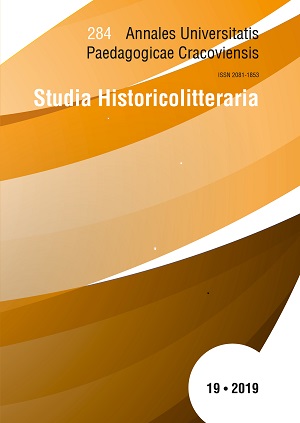One, none and one thousand. An Italian woman as a medium
Main Article Content
Abstract
The stake in a heated discussion on reviving tarantism in the Salentian culture by initiators and partcicipants of the project ‘The spider of a dancing god’ was the reinterpretation of the phenomenon itself: tarantism, which was perceived as a thing of the past and an embarrassing social problem, was to become artistically modified, namely isolated from life and displayed on stage. Rejecting tarantism as a folk practice and an attempt at representing it could also be interpreted as turning a blind eye to the problem of a woman’s position in society, without proposing anything in turn. Technological and social progress did not go hand in hand with the emancipation of an Italian woman. Luigi Piradnello in his drama, and Franka Rame in her monodrama captured this phenomenon brilliantly.
Downloads
Article Details

This work is licensed under a Creative Commons Attribution-NonCommercial-NoDerivatives 4.0 International License.
COPYRIGHT POLICY
The publisher of "Annales Universitatis Paedagogicae Cracoviensis.Studia Historicolitteraria" is authorised to use and distribute all the materials published in the journal on the basis of a non-exclusive licence agreement unlimited in time – previously concluded for an indefinite period of time each time with the author of a specific paper in the fields of exploitation specified in the agreement.
OPEN ACCESS POLICY
"Annales Universitatis Paedagogicae Cracoviensis.Studia Historicolitteraria” is an open access journal, and all its contents are available for free to users and/or their institutions on the basis of non-exclusive licenses under Creative Commons (CC BY CC-BY-4.0). Users can read, download, make copies, distribute, print, search, or to link to full text articles in this journal without the prior permission of the publisher or the author.This is consistent with the definition of open access BOAI (http://www.soros.org/openaccess).
References
A.O., Tak jest, jak się państwu zdaje, „Radio i Telewizja”, 9.07.1967, nr 28, http://encyklopediateatru.pl/artykuly/172465/tak-jest-jak-sie-panstwu-zdaje (dostęp 8.05.2017).
B.B., Tak jest, jak się państwu zdaje, „Radio i Telewizja”, 25.06.1967, nr 26, http://encyklopediateatru.pl/artykuly/172487/tak-jest-jak-sie-panstwu-zdaje (dostęp 8.05.2017).
Brahmer M., Spotkanie po 25 latach, [w:] Listy Teatru Polskiego. Sezon 1961–1962, nr 51, s. 16–19, http://www.eteatr.pl/pl/programy/2013_11/52024/tak_jest_jak_sie_ panstwu_zdaje_teatr_polski_warszawa_1961.pdf (dostęp: 8.05.2017).
De Martino E., Ziemia zgryzoty, przeł. W. Marucha, Warszawa 1971.
Heistein J., Wstęp, [do:] L. Pirandello, Wybór dramatów, oprac. J. Heistein, przeł. Z. Jachimecka, L. Chrzanowski i J. Jędrzejewicz, Wrocław 1978, s. III–LXXVI.
Lapassade G., Essai sur la trance, Paris 1976.
Łubieniewska E., Telewizyjne gry Pirandellem, „Annales Universitatis Paedagogicae Cracoviensis. Studia Historicolitteraria XVII” 2017, s. 135–149.
Krakowska J., PRL. Przedstawienia, Warszawa 2016.
Nocera M., Ukąszeni. Rozmowy z tarantystami, przeł. A. Koman i K. Woźniak, „Performer” 2017, nr 14, http://www.grotowski.net/performer/performer-14/psychodeliczny- -pajak-lapassade (dostęp: 23.09.2019).
Passerini L., Ambiwalencja wizerunku kobiety w kulturze masowej, [w:] Antropologia ciała, oprac. A. Chałupnik, J. Jaworska, J. Kowalska-Leder, I. Kurz i M. Szpakowska, red. M. Szpakowska, Warszawa 2008, s. 103–127.
Pirandello L., Wybór dramatów, oprac. J. Heistein, przeł. Z. Jachimecka, L. Chrzanowski i J. Jędrzejewicz, Wrocław 1978.
Pizza G., Il tarantismo oggi. Antropologia, politica, cultura, Roma 2015. Przedruk fragmentów w przekładzie na język polski: G. Pizza, Psychodeliczny pająk Lapassade’a, przeł. A. Koman i K. Woźniak, „Performer” 2017, nr 14, http://www.grotowski.net/ performer/performer-14/psychodeliczny-pajak-lapassade (dostęp: 23.09.2019).
Podgórzec Z., Przewrotna prawda Pirandella, „Ekran”, 16.07.1967, nr 29, http://encyklopediateatru.pl/artykuly/172473/przewrotna-prawda-pirandella (dostęp 8.05.2017).
Puzyna K., Pestka, [w:] tegoż, Burzliwa pogoda. Felietony teatralne, Warszawa 1971, s. 41.
Rame F., Fo D., Tutta casa, letto, chiesa. Sei monologhi, Mediolan 2006.
SEG., W plenerze (fragm.), „Głos Olsztyński”, 30.06.1967, nr 154, http://encyklopedia teatru.pl/artykuly/172485/w-plenerze-fragm (dostęp 8.05.2017).
Woźniak K., Przełamując tabu. Wokół apulijskiego tarantyzmu, „Performer” 2017, nr 14, http://www.grotowski.net/performer/performer-14/przelamujac-tabu-wokol- -apulijskiego-tarantyzmu (dostęp 23.09.2019).
